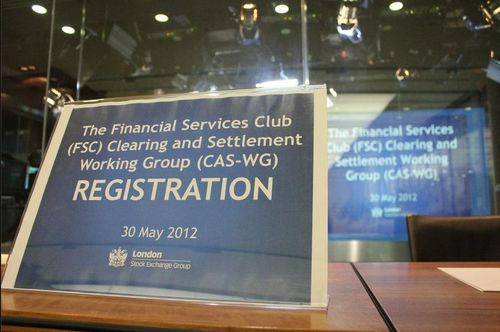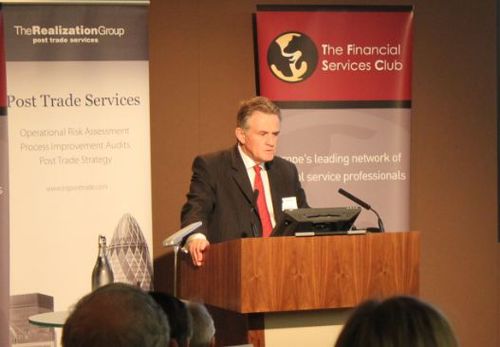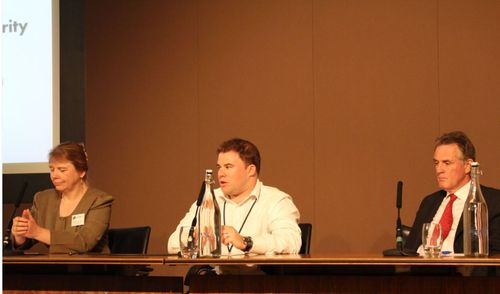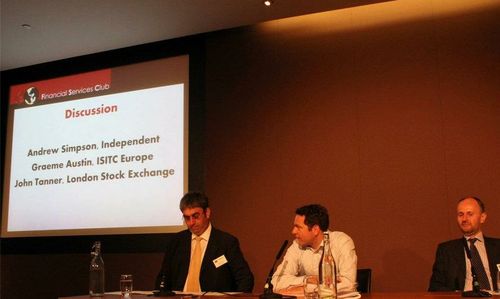
Yesterday marked another milestone in the progress of the Clearing & Settlement Working Group (CAS-WG), with our second plenary meeting.
This time it was held at the London Stock Exchange ...

... and discussed the progress of the four Subject Groups that were created after our first meeting at the beginning of March.
Since then, the four groups have met twice and created a rough agenda of their focal points.
It should be noted that these groups are still fledgling however, and until our next plenary on 18th July are open to influence. For example, two are still without confirmed Chairs and the other two Chairpersons will only be confirmed at the next meetings to be held in mid-June (if you want to Chair or Co-Chair any of these groups, then you need to attend or put your name forward for these meetings).
The four groups are looking at the impact of change in clearing and settlement infrastructures and cover:
- Risk;
- Regulation;
- Standards; and
- Market Infrastructures.
The aim of the four groups is to take the mass of regulatory change – Dodd-Frank, FATCA, EMIR, MiFID II, Basel III and more – and work out:
- what the regulation means and is trying to achieve;
- how joined up the regulation appears alongside other regulatory changes;
- if it achieves the regulatory objectives it sets out to achieve;
- if it is appropriate and feasible to implement as a result;
- how it will be implemented;
- what it means for systems and operations, and the changes required;
- what it means for products and services, and the changes required;
I
with the intent of arriving at conclusions which can be communicated to all parties.
The Subject Groups are open for anyone to attend, and are intended to generate a 360o view of the changes required for Clearing & Settlement over the coming years.
This is why we fully expect CSDs, CCPs, buy-side, sell-side, solutions providers, fund managers, corporates and more to get on board with the CAS-WG over time, many of whom were represented in the room yesterday.
The meeting covered the four working groups, who outlined the initial themes explored.
The Risk Subject Group is focused upon:
- Counterparty Risk – default management
- CCP default Risk
- Collateral Risk
- Operational Risk (Société Générale, UBS, JPMorgan)
- Market Risk (Eurozone)
- Enterprise Risk Management versus the silo approach
- Senior management engagement in risk management
The Group has nominated Paul Young, Associate Director for Business Risk Services at Grant Thornton as its Chair, and the next meeting of the Risk Subject Group will be on 20th June 2012.

The Regulation Subject Group is focused upon:
- Understanding new regulation, the impacts and cross-border inconsistencies
- Basel III and the treatment of collateral
- The European Markets Infrastructure Regulation (EMIR) and how it impacts both Over-the-Counter (OTC) Central Counterparty (CCP) clearing and Central Securities Depositories (CSD) regulation
- The Markets in Financial Instruments Directive revision (MiFID II) and its impact on internal infrastructures and the market at large
- The Financial Services Authority (FSA) break-up and how the new Bank of England regulator will change the City
- Dodd-Frank’s impact upon OTC derivatives CCP clearing
- Trade Repositories
The Group has Kiri Self of the Realisation Group as Acting Chair, and is open to nomination for this position. The Group’s next meeting will be on 18th June 2012.
The Standards Subject Group is focused upon:
- Legal Entity Identifiers (LEI’s) and the Financial Stability Board (FSB)
- CCP clearing
- The Foreign Account Tax Compliance Act (FATCA) and payment standards
- The move to T2S – Will this aid or hinder global standards?
- Unique identifiers in trade messaging
- CCP’s & the use (or not) of existing standards
- Retail banking implications as a result of FATCA developments
- TARGET2 for Securities (T2S) & post-trade compression
The Group has Darren Pearson of the Realisation Group as Acting Chair and is open for nomination for this position. The Group has its next meeting on 19th June 2012.
Finally, the Market Infrastructure Subject Group is focused upon:
- The impact to margin processes and valuation-risk of CCP’s
- The practical realities of clearing interoperability between differing clearing models
- Further entrants into the CCP space
- The impact of T2S in 2015 to post-trade functions
- The various aspects of the impact of trade repositories
The Group has nominated Kathleen Tyson-Quah of Granularity Ltd as its Chair, and has its next meeting on 21st June 2012.
After the outline of the discussions of each Subject Group, the plenary also had several panel discussions about the emerging themes under discussion and debate.
The first panel comprised:
- Kathleen Tyson-Quah, CEO of Granularity;
- Matthew Coupe, Director with Redkite Financial Markets; and
- Paul Young, Associate Director with Grant Thornton.

What came out of this for me was a lot of discussion about:
- how Value-at-Risk models are fundamentally flawed, vis-à-vis the JPMorgan Whale and more;
- the fact that we don’t even know what the problems are in financial markets, let alone solutions;
- that technology is making everything far too complex, vis-à-vis Andy Haldane’s reference to the fact that to understand a CDO these days requires reading 1,125,000 pages of documentation;
- that concentration risk is increasing as regulations drive more product clearing to fewer clearers; and
- that liquidity risk is increasing as Basel III, Dodd-Frank, Trade Repositories and more increases the likelihood that corporates and counterparties will just stop hedging or, even more worrisome, trading.
The outcome overall of this first panel was a clear view that markets have to wake up to the fact that if they cannot quantify and measure risk, then they should stop trading those products that create such risks.
That would be an awesome change of attitude.
The second panel comprised:
- Andrew Simpson, formerly with EuroCCP;
- Graeme Austin, CEO of ISITC Europe; and
- John Tanner, Manager with the London Stock Exchange.

This panel continued the dialogue with specific commentary around:
- how can we have a single global LEI referencing system when ISO, the FSB and the CFTC all seem to have different agendas?
- the fact we have more CCPs in Europe today than we had twenty years ago, regardless of European harmonisation and regulation to standardise and consolidate;
- the corporates do not see themselves as part of the financial markets, when they clearly are;
- that OTC Derivatives are moving through regulatory requirements towards being both on exchange and cleared, and whether the two parts could be separated or not;
- the EMIR is already going to miss its January 2013 deadline, according to EU head of the unit that drafted EMIR, Patrick Pearson;
and more.
The end result of these discussions included further questions from the floor, including a few challenging ones:
- as we have never had a CCP failure, what is the issue with CCP concentration risk?
- most banks are not even standardised and interoperable internally, so how can you expect the market to achieve standardisation?
and more.
All in all, a very positive start and lively future for the CAS-WG.
If you want to join in, attendance is free. The dates of future meetings are:
- The Regulation Subject Group’s next meeting will be on 18th June 2012
- The Standards Subject Group has its next meeting on 19th June 2012
- The Risk Subject Group will be on 20th June 2012
- The Market Infrastructure Subject Group has its next meeting on 21st June 2012
- The Next Plenary Meeting will be at the BT Auditorium on 18th July 2012
Oh, and there is an informal lunch on 10th July at Canary Wharf about Central Bank Systems for those interested too.
If you want to register for any of these meetings, just send an email to: chris.skinner@fsclub.co.uk, kamila@fsclub.co.uk or andy.coppell@fsclub.co.uk.
Chris M Skinner
Chris Skinner is best known as an independent commentator on the financial markets through his blog, TheFinanser.com, as author of the bestselling book Digital Bank, and Chair of the European networking forum the Financial Services Club. He has been voted one of the most influential people in banking by The Financial Brand (as well as one of the best blogs), a FinTech Titan (Next Bank), one of the Fintech Leaders you need to follow (City AM, Deluxe and Jax Finance), as well as one of the Top 40 most influential people in financial technology by the Wall Street Journal's Financial News. To learn more click here...

